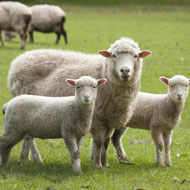Two SBV cases in Scotland

It can be difficult to predict how widespread any infection will be, but some important points give an indication of the likely impact of SBV in Scotland this spring.
Vets in Scotland have confirmed two cases of Schmallenberg virus (SBV) in malformed lambs over the past two weeks. The lambs were from two Scottish flocks close to the border with England.
The news follows reports of increased numbers of affected lambs in England and Wales during winter 2016/17.
SBV is spread by midges and can cause brain and limb deformities in newborn lambs and calves when pregnant animals are infected.
George Caldow, head of SAC Consulting Veterinary Services, said it can be difficult to predict how widespread any infection will be, but some important points give an indication of the likely impact of SBV in Scotland this spring.
Scotland’s Rural College (SRUC) has not diagnosed SBV in early lambing flocks or in all-year-round calving dairy herds, therefore it is unlikely that the virus was present in midges in Scotland at the time of maximum midge activity in 2016, or cases would have been seen in these animals.
“The midge population progressively declines as we move in to winter and midge numbers will have been low during the time of maximum vulnerability of the main Scottish spring lambing flock, which is likely to have been December and January,” Mr Caldow explained.
“Therefore it may be that only small number of ewes will have been infected with few affected lambs being born and these are more likely to be in flocks in the southernmost part of the country.
“The limited information we have to date suggests that the midge population in some parts of southern Scotland became infected in late autumn probably due to the gradual spread north of infected midges.”
SAC Consulting vets predict the highest risk will be to cattle mated in summer 2017, at the edge of the northward progression of infected midges. SRUC said it could be that only very limited spread of infected midges will occur in Scotland. Elsewhere the disease has been shown to have a patchy distribution.
Farmers seeking advice on SBV are urged to speak to their vet.



 The veterinary mental health charity Vetlife is inviting the veterinary community to join it for a sponsored cold-water dip.
The veterinary mental health charity Vetlife is inviting the veterinary community to join it for a sponsored cold-water dip.